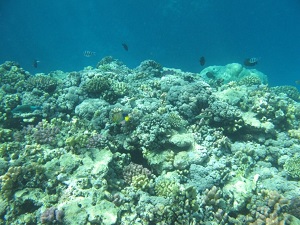Using AI to control energy for indoor agriculture
30 September 2024
Published online 22 September 2014
A brown algae found in the Red Sea contains compounds that researchers suspect may help develop an inhibitor for some strains of HIV.

© KAUST
Aqueous extracts of marine brown algae (Lobophoro variegata) can inhibit the replication of human immunodeficiency virus type 1 (HIV-1) by preventing its entry into host cells, a research team has revealed.
The algae extracts inhibit various HIV-1 strains – including a multi-drug resistant strain – that cause infection by binding to different cell-surface proteins of host cells. This could mean the brown algae is a potential natural source for developing a broad-spectrum anti-HIV-1 drug, suggests the research published in PLOS ONE1.
L. variegata is a common brown alga that thrives in the coral reefs of the Caribbean, the Indian Ocean and the Red Sea. It contains high concentrations of phenolic compounds, mainly bromophenols, and no previous studies had identified its antiviral effects.
“Our study is the first to demonstrate the anti-viral effects of L. variegata and thus contributes to the extraordinary bioactive spectrum of this abundant marine brown alga,” says Stephan Kremb, one of the authors of the study, a marine biologist from the King Abdullah University of Science and Technology (KAUST), Saudi Arabia, and Institute of Virology, Helmholtz Zentrum Muenchen, Germany.
The scientists exposed aqueous extracts of the brown algae to various patient-derived HIV-1 strains grown in peripheral blood mononuclear cells prepared from the whole blood of healthy donors. The algae extracts were non-toxic and inhibited the replication of the HIV-1 strains in the cells.
To understand how the algae extracts inhibit the virus, the researchers added fluorescent-protein-labelled HIV-1 particles and specific indicator cells to the algae extracts. They found that the algae extracts prevented the attachment of the HIV-1 particles to the cells, suggesting it inhibits HIV-1 entry into the cells.
Current HIV drugs work by preventing the binding of HIV-1 viruses to cell-surface proteins of host cells. “In contrast, the algae extracts seem to directly interact with the viral particles by targeting their membranes,” says Kremb.
Kremb says that this anti-HIV-1 action of the brown algae extracts is different from the inhibitory effects of the experimental anti-HIV-1 drug Griffithsin, which has been isolated from the marine red alga Griffithsia.
Kanji Hori from the Laboratory of Marine Bio-resource Chemistry of Hiroshima University, Japan, says marine algae such as the L. variegata are rich in polyphenols which may have non-specifically attached to viral proteins, contributing to the anti-HIV-1 activities of the algae extracts. However, with current analytical techniques, it is difficult to pin down specific algae polyphenols with anti-HIV activities, suggesting that further innovative structural analyses are needed to identify any potential lead compounds with anti-HIV-1 activity, he adds.
doi:10.1038/nmiddleeast.2014.234
Kremb, S. et al. Aqueous extracts of the marine brown alga Lobophora variegata inhibit HIV-1 infection at the level of virus entry into cells. PLOS ONE http://dx.doi.org/10.1371/journal.pone.0103895 (2014)
Stay connected: